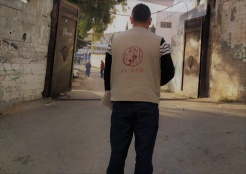On 31 January 2022, Al-Marsad, Al-Haq, the Palestinian Human Rights Organizations Council, the International Network for Economic, Social and Cultural Rights (ESCR-Net), the International Human Rights Clinic of Cornell Law School and the International Human Rights Clinic of the Boston University’s School of Law submitted a joint report on the Repression of Human Rights Defenders in Israel, the Occupied Territories of Palestine and the Golan to the UN Special Rapporteurs on the Situation of Human Rights Defenders, the Situation of Human Rights in the Palestinian Territory, the Rights to Freedom of Peaceful Assembly and of Association, the Freedom of Opinion and Expression, and Contemporary Forms of Racism.
This report is submitted against the backdrop of increasing surveillance and persecution of Palestinian human rights defenders and an unprecedented level in the deterioration of civil society organizations’ and individuals’ freedom of action. Although local organizations advocating for Israel’s compliance with international law, have become accustomed to verbal, physical and digital attacks, threats to funding, and lawsuits that follow the pursuance of their work, the past two years have been exceptionally challenging.[1]
On 19 October 2021, the Israeli Minister of Defense took unprecedented measures against civil society organizations by issuing an order that designated six Palestinian non-governmental organizations as “terrorist organizations.”[2] These organizations include Al-Haq, Addameer, Defense for Children-Palestine, the Union of Agricultural Work Committees, the Union of Palestinian Women Committees, and the Bisan Center for Research and Development. This military order, outlawing the six Palestinian Organizations, authorizes the army, on suspicion of membership in or association with a “terrorist group”, to arrest and detain their employees, raid their offices, freeze their bank accounts and seize their property.[3] These orders constitute harassment and intimidation aimed at exerting pressure on the organizations’ funders and jeopardizing their operations, while simultaneously attempting to create a chilling effect on other human groups operating in the region more broadly.
Over the past decade, Israel has developed a sophisticated set of laws, policies and practices to discredit and defund organizations that work to expose human rights violations in Palestine, Israel and the occupied Golan.[4] Additionally, private actors have also been enabled and supported in their efforts to silence the voices of these human rights defenders.[5] This report aims to document the cumulative impacts of Israel’s policies and practices on human rights defenders throughout the land governed or occupied by Israel, including Palestine and the Syrian Golan, where its military occupation is too often forgotten.
In November 2019, Cornell Law School’s International Human Rights Clinic conducted interviews with ten local human rights organizations. Responses from other organizations were subsequently solicited in an online survey. As outlined in the report, all human rights organizations surveyed reported that recent Israeli laws and policies had undermined their work and half of them rated its negative impact as high. The report summarizes the findings of those interviews and survey responses, revealing that Israel’s laws, policies, practices and the broader imposed political climate have caused human rights defenders to:
- Engage in self-censorship to avoid legal repercussions;
- Defend themselves against harassment and attacks on their reputation by private and parastatal organizations operating with the support of the Israeli government;
- Witness the erosion of support for their activities from the Israeli public and the international community;
- Endure restrictions on their movement and;
- Expend scarce resources and time to justify and defend their activities before donors and others.
In light of the above facts, we recommend that the United Nations Special Procedures, the international community, the Government of the United States, and civil society call on Israel to:
- Restore and protect the rights of all human rights defenders operating in territories Israel controls, regardless of their viewpoints, as required under Articles 2, 19 and 22 of the ICCPR.
- Repeal the following laws, and any other laws that violate Articles 2, 19 and 22 of the ICCPR: the Mandatory Disclosure of Foreign Entity Funding Law; the Law for Prevention of Damage to the State of Israel through Boycott; Amendment No. 28 to the Entry to Israel Law; Israel—the Nation-State of the Jewish People Law; Nakba Law; and the Breaking the Silence Law.
- Cease to enact new laws that violate Articles 2, 19 and 22 of the ICCPR and stifle the voices of human rights defenders.
- Regulate the activities of pro-government private organizations to ensure they do not infringe on the rights of other groups and individuals.
- Comply with United Nations Security Council Resolution 242, which requires that Israel withdraw from all territories it occupies. 16
- Ensure that Israeli courts provide fair trials under the law.
- Curtail the government’s active attacks on civil society through entities like the Ministry of Strategic Affairs.
All of the entities listed above should continually engage with and listen to civil society challenging the Israeli occupation to understand their ongoing struggles.
For full report please see here
[1] Al-Haq, ‘New Report: Designated Shrinking Space: Israel’s Systematic Harassment Campaigns Against Al-Haq, Are the Acts of an Illegal Apartheid Regime’, 2021
[2] Al-Haq, ‘PNGO & PHROC: Israel’s Sinister Designation of 6 Leading Palestinian Organizations As “Terror Organizations” Is an Attempt to Silence and Control Palestinians’, 2021
[3] Al-Haq, ‘Alert: Israel Takes Alarming Steps to Enforce Its Persecution of Six Palestinian Organisations in the West Bank, International Community Must Intervene’, 2021
[4] Al-Haq, ‘Designated Shrinking Space’, 2021
[5] Al-Haq, ‘Israel’s Ongoing and Systematic Smear Campaign against Al-Haq and Its Staff Members, Including Hate Speech and Death Threats’, 2020



